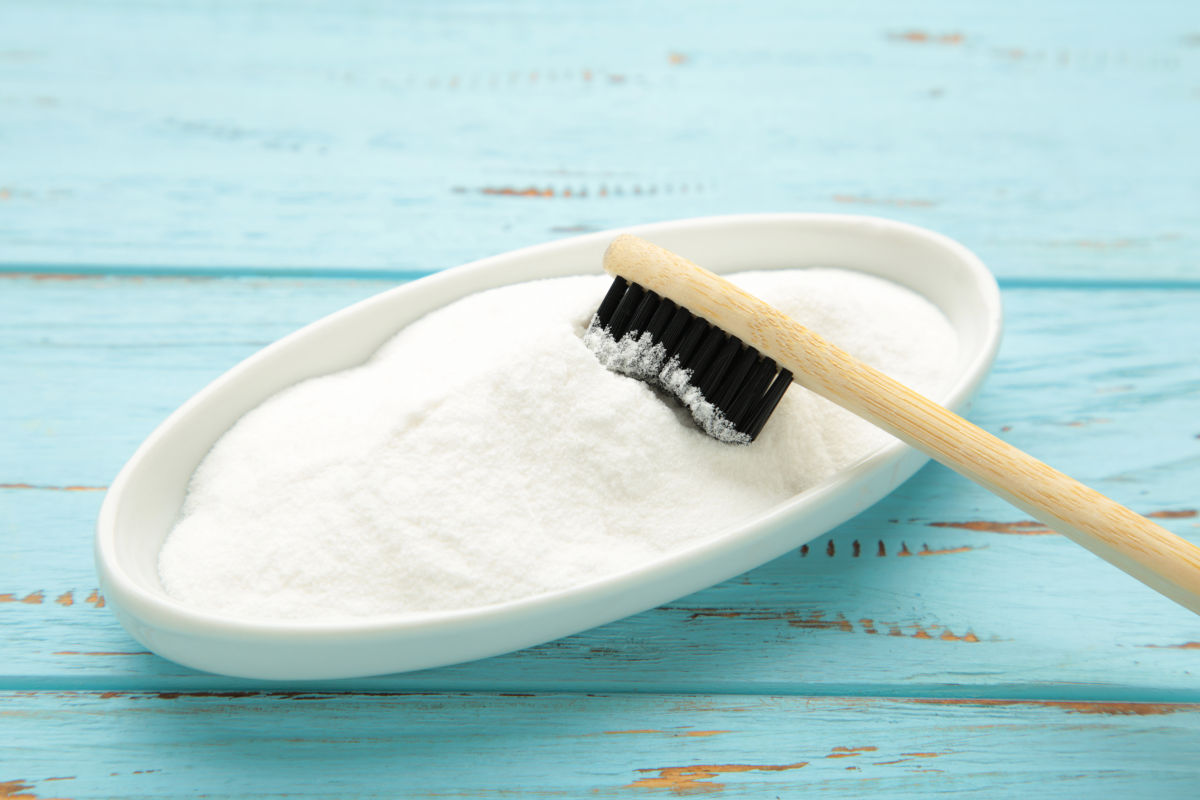Contents

Baking Soda for White Teeth: How-To, Risks, and Alternatives
Do you dream of a dazzling smile but are concerned about your teeth yellowing? Don't worry, there are natural and inexpensive solutions for whiter teeth. Among them, baking soda stands out as a popular at-home remedy. But how does it work? Is it safe for your teeth? And what are the alternatives? We'll tell you everything in this article.
How Does Baking Soda Whiten Teeth?
Baking soda, or sodium bicarbonate, is a chemical compound that works on teeth in two primary ways:
- Mild Abrasive Action: Baking soda is a mild abrasive, which means its fine, crystalline particles can gently scrub and polish the tooth surface. This physical action is effective at removing extrinsic (surface) stains caused by things like coffee, tea, and tobacco.
- Alkaline Properties: Baking soda is alkaline, meaning it helps to neutralize acids in the mouth. A less acidic oral environment is less favorable for the growth of bacteria that contribute to plaque and tooth decay.
It's important to note that baking soda only removes surface stains; it does not change the intrinsic (natural) color of your teeth the way chemical bleaching agents like hydrogen peroxide do.
The Safe Way to Use Baking Soda for Teeth Whitening
If you choose to use baking soda, it's crucial to do so safely to avoid damaging your enamel. Here is the American Dental Association (ADA) recommended method:
- Create a Paste: Mix a small, equal amount of baking soda and water in a bowl to form a paste with a consistency similar to toothpaste.
- Apply Gently: Apply the paste to a soft-bristled toothbrush and brush gently in circular motions for no more than two minutes.
- Limit Frequency: Do not use this method more than once or twice per week. Overuse can be harmful.
Never brush aggressively, and always rinse your mouth thoroughly with water afterward. If you have sensitive gums or known enamel weakness, consult your dentist before trying this method.
Understanding the Risks of Using Baking Soda on Your Teeth
While effective at removing surface stains, baking soda is not without risks, especially with improper use:
- Enamel Abrasion: Despite being a mild abrasive, frequent or aggressive brushing with baking soda can wear down your protective tooth enamel over time. This can lead to increased tooth sensitivity and a higher risk of cavities.
- Gum Irritation: The gritty texture can be irritating to the gums, particularly if they are already sensitive.
- No Fluoride Benefit: Baking soda does not contain fluoride, which is essential for strengthening enamel and preventing decay. It should never be used as a complete replacement for your regular fluoride toothpaste.
The Dentist's View: Professional vs. DIY Whitening
Most dental professionals view baking soda as a safe, occasional supplement for stain removal but caution against it as a primary whitening solution. For dramatic and long-lasting results, they recommend professional treatments.
Professional whitening, whether in-office or with take-home kits provided by your dentist, uses peroxide-based bleaching agents that change the intrinsic color of your teeth. These methods are more effective, longer-lasting, and are performed under the supervision of a dental professional who can ensure the safety of your teeth and gums.
Safer and More Effective Whitening Alternatives
If you're looking for a brighter smile, consider these dentist-approved options:
- Whitening Toothpastes: Look for toothpastes with the ADA Seal of Acceptance that contain mild abrasives and chemical agents to polish away surface stains.
- Over-the-Counter Whitening Strips: Products like Crest 3D Whitestrips use a peroxide-based gel to whiten teeth and are proven to be effective and safe when used as directed.
- Professional In-Office Whitening: The fastest and most effective way to whiten your teeth, performed by your dentist using a high-concentration bleaching gel.
The Verdict: Should You Use Baking Soda on Your Teeth?
When used sparingly and correctly, baking soda can be a natural and economical way to help remove surface stains and brighten your smile. However, it is not a substitute for professional whitening and carries the risk of enamel damage if overused. For significant and long-lasting whitening, dentist-approved alternatives are both safer and more effective. Remember, the foundation of a white, healthy smile is always excellent oral hygiene: brush twice a day with fluoride toothpaste, floss daily, and see your dentist for regular cleanings.
FAQ: Your Top Questions About Baking Soda for Teeth
No, it is not recommended. Daily use of baking soda can be too abrasive for your tooth enamel, leading to wear and increased sensitivity over time. Most dentists recommend limiting its use to once or twice a week at most.
They work differently. Baking soda is an abrasive that physically removes surface stains. Hydrogen peroxide is a bleaching agent that chemically lightens the intrinsic color of the tooth. Hydrogen peroxide is more effective for deep whitening, but it also carries a higher risk of sensitivity and should be used with caution, preferably in products designed for dental use.
Baking soda can help remove soft plaque before it hardens, but it cannot remove existing tartar (hardened calculus). Once plaque has mineralized into tartar, it can only be removed by a dental professional during a scaling procedure.
You may notice a slight brightening effect after the first few uses as surface stains are removed. However, for a noticeable change in shade, it can take several weeks of consistent, twice-weekly use. The results will be subtle compared to professional whitening treatments.
